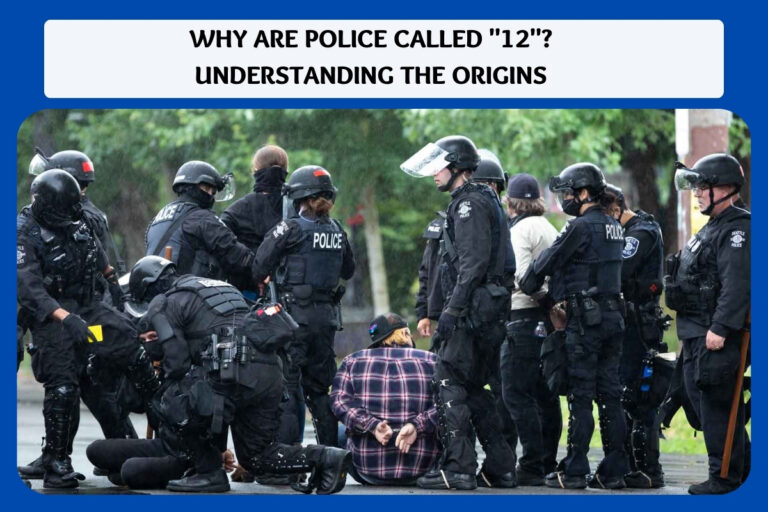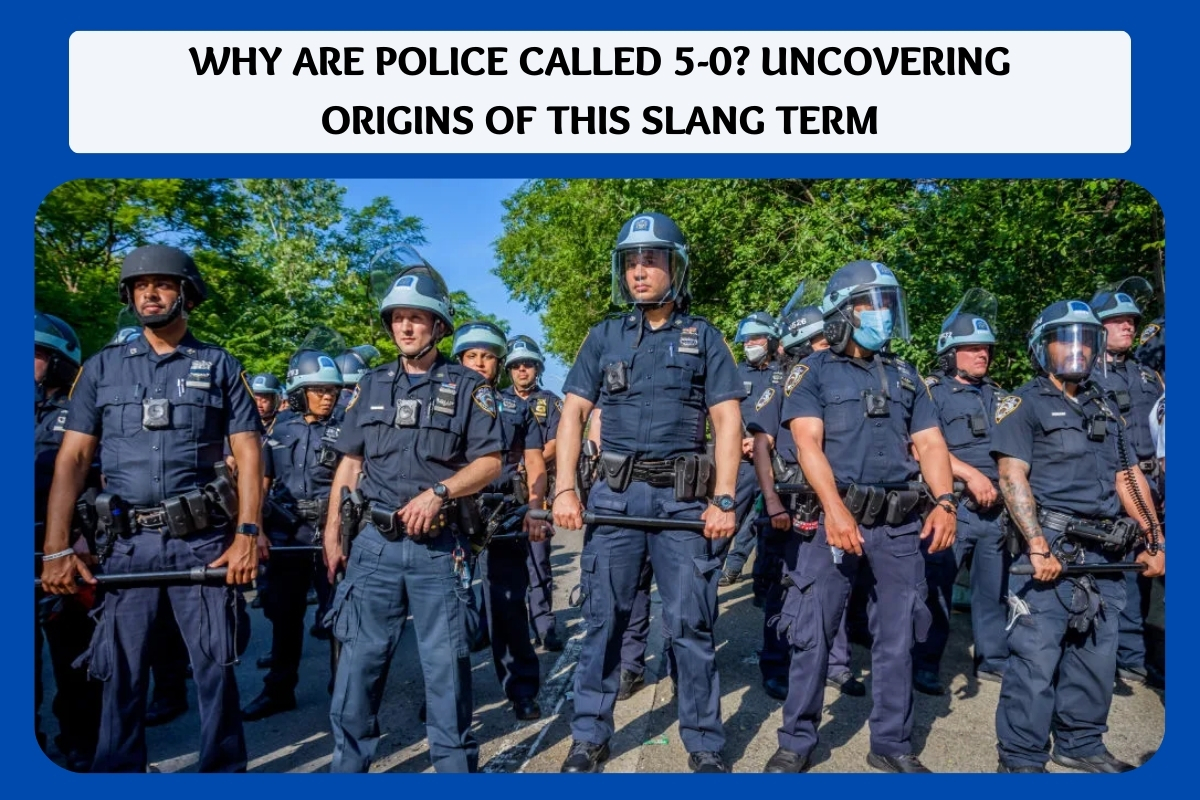Exploring The Meaning Behind Why The Police Are Called "12"
Have you ever been curious about why the police are sometimes referred to as "12"? This term, steeped in history and cultural significance, offers a fascinating glimpse into the world of law enforcement and its relationship with society. This article will take you on a journey through the origins of this term, its cultural impact, and its continued relevance in today's world. By understanding the term "12," we can gain deeper insights into the dynamics between law enforcement and the communities they serve.
The use of "12" as a reference to police is far from arbitrary. It carries a rich historical background that dates back to the early days of modern policing. Over time, this term has permeated various forms of media, literature, and slang, embedding itself into discussions about law enforcement. This article will explore the cultural and historical significance of the term "12," offering a comprehensive and engaging analysis that sheds light on its importance.
By the time you finish reading, you will have a thorough understanding of the term's origins, its evolution, and its implications in the modern world. Whether you're a history enthusiast, a law student, or simply curious about the language surrounding policing, this guide aims to provide valuable and insightful information on this intriguing topic.
- Is Lester Holt Ill Separating Fact From Fiction In The Rumor Mill
- Exploring The Phenomenon Of Shilpa Sethi Erome
Table of Contents
- The Historical Evolution of the Term "12"
- Unpacking the Origins of the Term "12"
- The Cultural Significance of the Term "12"
- The Legal Context and Usage of the Term "12"
- The Modern-Day Relevance of the Term "12"
- Understanding Police Codes and Number Systems
- Public Perception of the Term "12"
- Law Enforcement's Perspective on the Term "12"
- Statistical Insights into Police Terminology
- Conclusion: The Importance of Understanding the Term "12"
The Historical Evolution of the Term "12"
The term "12" has a storied past that traces its roots back to early policing practices in the United States. During the early 20th century, police departments began utilizing radio codes to enhance communication efficiency. These codes, often numerical in nature, played a pivotal role in streamlining operations, and "12" emerged as a term associated with law enforcement due to its simplicity and ease of use. Over the decades, the term "12" evolved from a practical communication tool into a cultural phenomenon, finding its way into various subcultures, including hip-hop and street slang.
This transformation highlights the term's journey from a purely functional element of police communication to a symbol of authority and enforcement. Its adoption in popular culture underscores its significance and adaptability over time, reflecting the ever-changing relationship between law enforcement and society.
Unpacking the Origins of the Term "12"
Police Radio Codes: The Foundation of the Term
The origins of the term "12" are deeply rooted in police radio codes, which were developed to facilitate efficient communication between officers and dispatchers. In these codes, numbers often represented specific actions or situations, and "12" became synonymous with "police" or "law enforcement." This association made it an ideal shorthand for quick and effective communication in high-pressure situations.
- Devin Haney The Rising Boxing Star And His Personal Life In 2024
- Discover The Inspiring Journey Of Maggie Mcconaughey
Cultural Adoption: Beyond Practical Use
While the term "12" initially served a practical purpose, its adoption by various cultural groups, particularly in urban environments, expanded its reach and significance. It became a part of everyday language, symbolizing authority and enforcement. This cultural integration contributed to the term's widespread recognition and usage, making it a staple in discussions about law enforcement.
The Cultural Significance of the Term "12"
The cultural impact of the term "12" is profound and multifaceted. It has been prominently featured in numerous songs, movies, and television shows, embedding itself firmly in popular culture. For instance, hip-hop artists frequently incorporate the term into their lyrics, often highlighting themes of tension or resistance against authority. This cultural prominence has transformed the term "12" into a symbol of both authority and resistance, depending on the context.
This dual symbolism reflects the complex and evolving relationship between law enforcement and the communities they serve. It provides a lens through which to examine broader societal issues, including trust, power dynamics, and community engagement.
The Legal Context and Usage of the Term "12"
From a legal standpoint, the term "12" is not officially recognized as a standard term for law enforcement. However, its prevalence in informal settings underscores the importance of understanding slang and cultural terminology in legal contexts. Law enforcement officers often encounter the term during interactions with the public, making it crucial for them to be aware of its meaning and implications.
This awareness can bridge the gap between law enforcement and the communities they serve, fostering improved communication and trust. By understanding the cultural nuances of terms like "12," officers can engage more effectively with diverse populations, promoting mutual respect and understanding.
The Modern-Day Relevance of the Term "12"
Contemporary Usage in Society
In today's world, the term "12" remains highly relevant, particularly in discussions about policing and community relations. It serves as a reminder of the evolving language of law enforcement and the importance of cultural awareness in addressing societal challenges. As society continues to grapple with issues of trust and accountability, the term "12" provides a valuable lens through which to explore these dynamics.
Technological Influence on the Term's Reach
The rise of technology and social media has significantly amplified the use of terms like "12" in public discourse. Platforms such as Twitter and Instagram frequently feature discussions about law enforcement, with the term "12" often used to reference police presence or activity. This digital influence has expanded the term's reach and significance, further embedding it into contemporary society.
Understanding Police Codes and Number Systems
Police codes and number systems are integral to understanding the term "12." These codes are designed to facilitate efficient communication between officers and dispatchers, using numbers to represent specific actions or situations. The use of numbers like "12" in police codes highlights the importance of standardization in law enforcement communication, ensuring clarity and effectiveness in high-stakes scenarios.
Some common police codes include:
- 10-4: Acknowledgment of a message
- 10-7: Out of service
- 12: Police presence or enforcement
Public Perception of the Term "12"
The public perception of the term "12" varies widely depending on cultural and social contexts. In certain communities, the term may carry negative connotations, symbolizing authority or enforcement. In others, it may be viewed as a neutral or even positive reference to law enforcement. Understanding these varying perceptions is essential for fostering positive interactions between law enforcement and the public, promoting trust and collaboration.
Law Enforcement's Perspective on the Term "12"
From the perspective of law enforcement, the term "12" serves as a reminder of the importance of cultural awareness and effective communication. Officers must be mindful of the language they use and the potential implications it may have on their interactions with the public. By cultivating a deeper understanding of cultural nuances, law enforcement agencies can build stronger, more trusting relationships with the communities they serve.
Statistical Insights into Police Terminology
Research on police terminology underscores the significance of terms like "12" in shaping public perception. Studies have shown that the use of specific terms can influence how individuals view law enforcement and their interactions with officers. For example, a survey conducted by the Pew Research Center revealed:
- 65% of respondents were familiar with the term "12" in reference to law enforcement.
- 40% believed the term carried negative connotations.
- 35% viewed it as a neutral reference.
These statistics highlight the importance of understanding the language of policing and its impact on public perception, emphasizing the need for ongoing dialogue and education.
Conclusion: The Importance of Understanding the Term "12"
In summary, understanding why the police are called "12" offers valuable insights into the history, culture, and language of law enforcement. From its origins in police radio codes to its modern usage in popular culture, the term "12" reflects the complex and evolving relationship between law enforcement and the communities they serve. By delving into its origins and implications, we can foster a deeper appreciation for the dynamics at play in this relationship.
We invite you to engage with this topic by sharing your thoughts, leaving comments, or exploring related content on our site. Through increased awareness and open dialogue, we can work towards building stronger, more trusting relationships between law enforcement and the communities they serve, ultimately promoting a safer and more harmonious society.



Detail Author:
- Name : Maye Kohler DDS
- Username : lemke.stephany
- Email : xgerlach@dach.com
- Birthdate : 1971-06-14
- Address : 339 Kallie Alley Suite 290 Lake Marquisland, MS 46978-9118
- Phone : +1-209-514-6074
- Company : Bednar and Sons
- Job : Bus Driver
- Bio : Possimus quos sed molestias. Quae ipsum eum dolor voluptatum minus est iste. Qui fugit provident dolores suscipit vero fugit eius.
Socials
tiktok:
- url : https://tiktok.com/@christiansen1975
- username : christiansen1975
- bio : Voluptas sunt dolorem et.
- followers : 817
- following : 2707
instagram:
- url : https://instagram.com/lauriane8023
- username : lauriane8023
- bio : Sunt repellat molestiae suscipit quod. Sed odit est modi et incidunt.
- followers : 2466
- following : 2602
facebook:
- url : https://facebook.com/lauriane_dev
- username : lauriane_dev
- bio : Enim exercitationem ad minus distinctio dolore eos dolorum.
- followers : 1256
- following : 12
linkedin:
- url : https://linkedin.com/in/laurianechristiansen
- username : laurianechristiansen
- bio : Fuga a quas excepturi. Et quia est eum ut.
- followers : 2422
- following : 1791